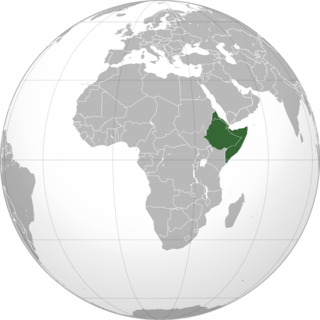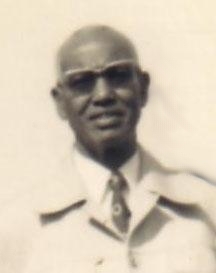Djibouti is a country in the Horn of Africa. It is bordered by Somalia to the southeast, Eritrea and the Red Sea to the north and northeast, Ethiopia to the west and south, and the Gulf of Aden to the east.

Politics of Djibouti takes place in a framework of a presidential representative democratic republic, whereby the executive power is exercised by the President and the Government. Legislative power is vested in both the Government and the National Assembly. The party system and legislature are dominated by the socialist People's Rally for Progress. In April 2010, a new constitutional amendment was approved. The President serves as both the head of state and head of government, and is directly elected for single six-year term. Government is headed by the President, who appoints the Prime Minister and the Council of Ministers on the proposal of the latter. There is also a 65-member chamber of deputies, where representatives are popularly elected for terms of five years. Administratively, the country is divided into five regions and one city, with eleven additional district subdivisions. Djibouti is also part of various international organisations, including the United Nations and Arab League.
A referendum is a direct vote in which an entire electorate is invited to vote on a particular proposal. This may result in the adoption of a new law. In some countries, it is synonymous with a plebiscite or a vote on a ballot question.

The Horn of Africa is a peninsula in Northeast Africa. It extends hundreds of kilometers into the Arabian Sea and lies along the southern side of the Gulf of Aden. The area is the easternmost projection of the African continent. Referred to in ancient and medieval times as the land of the Barbara and Habesha, the Horn of Africa denotes the region containing the countries of Djibouti, Eritrea, Ethiopia, and Somalia.

"Djibouti" is the national anthem of the Republic of Djibouti.

The French Territory of the Afars and the Issas was the name given to present-day Djibouti between 1967 and 1977, while it was still an overseas territory of France. The area was formerly known as French Somaliland.

Hassan Gouled Aptidon was the first President of Djibouti from 1977 to 1999.

Greater Somalia comprises the regions in or near the Horn of Africa in which ethnic Somalis live and have historically inhabited. The territory historically encompassed British Somaliland, Italian Somaliland, French Somaliland, the Ogaden in the Ethiopian Empire, and the Northern Frontier District in the Colony and Protectorate of Kenya - at the present day, it encompasses Somalia, eastern Djibouti, the Somali region and Dire Dawa in Ethiopia, and the Lamu, Garissa, Wajir and Mandera Counties in Kenya.

The Ogaden War was a Somali military offensive between July 1977 and March 1978 over the disputed Ethiopian region of Ogaden, which began with the Somali invasion of Ethiopia. The Soviet Union disapproved of the invasion and ceased its support of Somalia, instead starting to support Ethiopia; the United States, conversely, ceased its support of Ethiopia and started supporting Somalia. Ethiopia was saved from a major defeat and a permanent loss of territory through a massive airlift of military supplies, the arrival of 16,000 Cuban troops, 1,500 Soviet advisors and two brigades from South Yemen, also airlifted to reinforce Harar. The Ethiopians prevailed at Harar, Dire Dawa and Jijiga, and began to push the Somalis systematically out of the Ogaden. By March 1978, the Ethiopians had captured almost all of the Ogaden, prompting the defeated Somalis to give up their claim to the region. A third of the initial Somali National Army invasion force was killed, and half of the Somali Airforce destroyed; the war left Somalia with a disorganized and demoralized army and an angry population. All of these conditions led to a revolt in the army which eventually spiraled into a civil war and Somalia's current situation.

The Somali Republic was the official name of Somalia after independence on July 1, 1960, following the unification of the Trust Territory of Somaliland and the State of Somaliland. A government was formed by Abdullahi Issa Mohamud and Muhammad Haji Ibrahim Egal and other members of the trusteeship and protectorate administrations, with Haji Bashir Ismail Yusuf as President of the Somali National Assembly and Aden Abdullah Osman Daar as President of the Somali Republic. On 22 July 1960, Daar appointed Abdirashid Ali Shermarke as Prime Minister. On 20 July 1961 and through a popular referendum, the people of Somalia ratified a new constitution, which was first drafted in 1960. The administration lasted until 1969, when the Supreme Revolutionary Council (SRC) seized power in a bloodless putsch and renamed the country the Somali Democratic Republic.

Djibouti is a country located in the Horn of Africa. It is bordered by Eritrea in the north, Ethiopia in the west and south, and Somalia in the southeast. The remainder of the border is formed by the Red Sea and the Gulf of Aden at the east. Djibouti occupies a total area of 23,200 km2 (8,958 sq mi).
Republican Union was a political party in French Somaliland.

Mahmoud Harbi Farah was a Somali politician. A pan-Somalist, he was the Vice President of the Government Council of French Somaliland from 1957 to December 1958, during Djibouti's pre-independence period.

An independence referendum was held in the French Territory of the Afars and the Issas on 8 May 1977 alongside an election for a Constituent Assembly. Previous referendums were held in 1958 and 1967, which rejected independence. This referendum backed independence from France. The territory became independent as Djibouti on 27 June 1977.

A referendum on the new constitution of France was held in French Somaliland on 28 September 1958 as part of a wider referendum held across the French Union. The new constitution would see the country become part of the new French Community if accepted, or result in independence if rejected. It was approved by 75.24% of voters.

An independence referendum was held in the Republic of Slovenia on 23 December 1990. Both the ruling centre-right coalition and the left-wing opposition supported the referendum and called on voters to support Slovenian independence.
A referendum is a direct vote in which an entire electorate is asked to either accept or reject a particular proposal. This article summarises referendum laws and practice in various countries.
The Democratic Union Issa (UDI) was a political party of French Somaliland and the French Territory of the Afars and the Issas.
The Party of Popular Movement (PMP) was a political party of French Somaliland and the French Territory of the Afars and the Issas.
A referendum on the political status of Puerto Rico was held in Puerto Rico on June 11, 2017. The referendum had three options: becoming a state of the United States, independence/free association, or maintaining the current territorial status. Those who voted overwhelmingly chose statehood by 97%; turnout, however, was 23%, a historically low figure. This figure is attributed to a boycott led by the pro-status quo PPD party.















